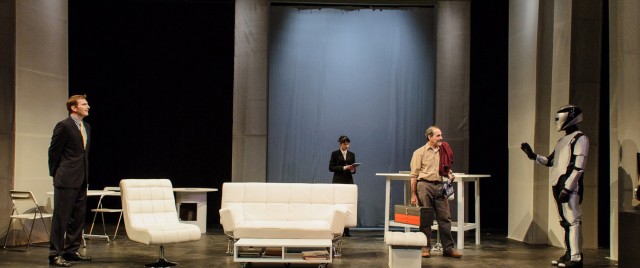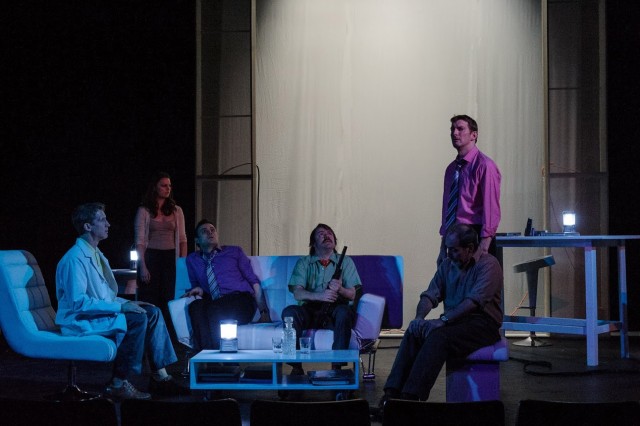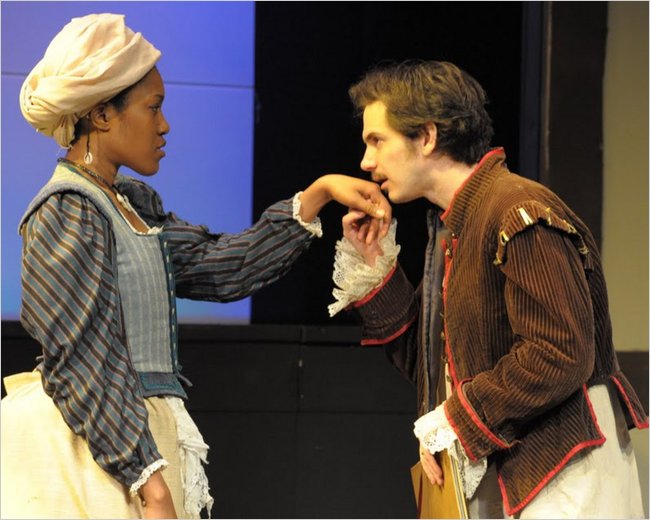
Karel Čapek’s “R.U.R.” examines the classic battle between man and machine (photo by Jon Kandel)
Beckett Theatre, Theatre Row
410 West 42nd St. between Ninth & Tenth Aves.
Through February 2, $18
www.resonanceensemble.org
“There’s no progress. There’s never any progress,” engineer Josef Alquist (Chris Ceraso) says at the beginning of Resonance Ensemble’s revival of Karel Čapek’s 1920 play, R.U.R. The seldom-performed work, being presented at the Beckett Theatre at Theatre Row in a 2002 adaptation by Lee Eric Shackleford that modernizes some of the story, is most well known for its lasting legacy: Not only did the play introduce the word “robot” to the international lexicon (Čapek credited the actual invention of the term to his brother Joseph), but it also set up many of the themes that continue to dominate science-fiction tales today. Set in the 2030s on isolated Rossum Island in the South Pacific, R.U.R., which stands for Rossum’s Universal Robots, follows a small group of scientists and businessmen who are making and selling mechanical men and women to serve in various capacities, from butlers and maids to sexual partners. Helena Gloriov (Christine Bullen) arrives from the League of Humanity, concerned that these robots, which contain organic matter, are being treated like slaves. She has an ethical discussion with Henry Domin (Brad Makarowski), a former lover and current head of R.U.R., about the sentience of such robots as his personal assistant, Sulla (Jane Cortney), who is remarkably lifelike, but he insists, “She’s not alive. She’s a machine with no more notion that she’s alive than she would if she was a geranium in a flowerpot.” But as the serious Dr. Fabry (Matt W. Cody), the jittery Dr. Gall (Kevin Bernard), and the sex-starved, goofy Dr. Hallemeier (Mac Brydon) can’t stop playing god and “improving” their creations in secret new ways, one of the robots, Radius (Tyler Caffall), begins to get ideas of his own, setting up a classic battle of man vs. machine.

A dark future awaits humanity in Karel Čapek’s prescient “R.U.R.” (photo by Jon Kandel)
Directed by Valentina Fratti (Two Brothers, Howling Hilda), R.U.R. is set in a futuristic white room in which the characters debate the ethics and responsibilities of what they’re doing in a world where the number of robots are increasing while the amount of human births is dropping precipitously. The story is told in flashback by Alquist (strongly played by Ceraso), the only human on the island who still works with his hands; he is recording a message about what happened, and things look pretty bleak. Shackleford has updated elements of the plot, adding references to stem cells, for example, to avoid feeling too old-fashioned, but the play still has plenty of clunky moments that reveal its age. Yet even after all these years, it continues to bring up fascinating issues and ethical dilemmas that remain compelling even though we’ve seen them since in the works of Isaac Asimov, Ray Bradbury, and Philip K. Dick and such television shows as The Twilight Zone. To further put Čapek’s (War with the Newts) work in perspective, Resonance Ensemble is performing R.U.R. in repertory with Richard Manley’s The Truth Quotient, which also examines the impact of technology on humanity; in addition, several of the performances will be followed by talk backs with artistic director Eric Parness, the playwrights, and various technology experts. (Fun fact: Spencer Tracy played a robot in the 1953 Broadway version of R.U.R.)
